International Commercial Maritime Law: Open Registries Reform
VerifiedAdded on 2022/12/28
|12
|4453
|73
Report
AI Summary
This report provides an overview of international commercial maritime law, emphasizing the significance of ship registration and the role of open registries. It delves into the legal frameworks governing maritime activities, including the registration, inspection, and licensing of ships. The report examines the concept of flag of convenience and its implications, highlighting the criticisms associated with open registries, such as potential involvement in criminal activities, environmental impacts, and poor working conditions for seafarers. It further explores the advantages and disadvantages of open registry systems, including economic benefits, cost control for shipowners, and flexibility in regulations. The report concludes by emphasizing the necessity for reform to address issues like transparency, environmental protection, and seafarer welfare, advocating for stricter regulations and international cooperation to mitigate the negative consequences associated with open registries. The report also emphasizes the importance of the genuine link concept as a potential reform option.
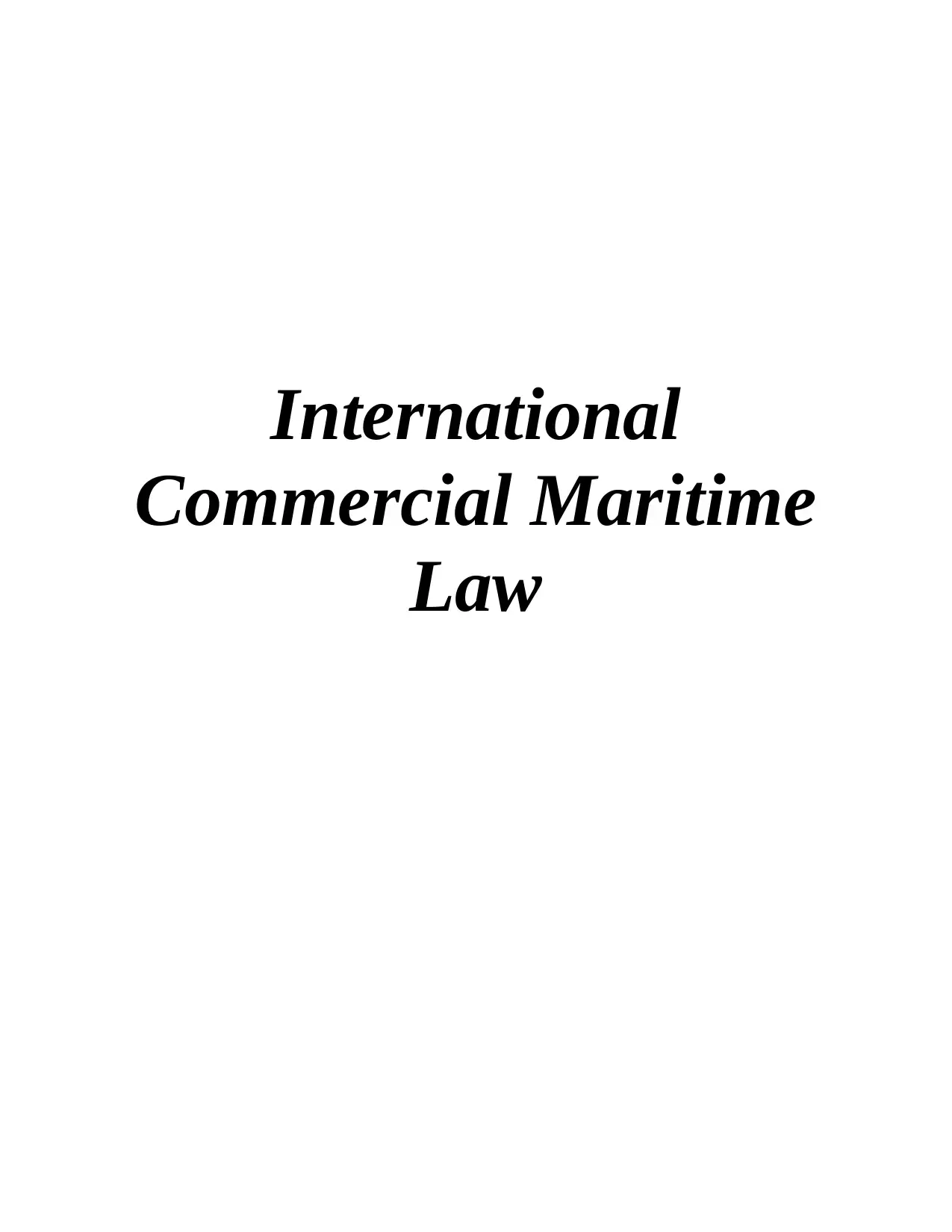
International
Commercial Maritime
Law
Commercial Maritime
Law
Paraphrase This Document
Need a fresh take? Get an instant paraphrase of this document with our AI Paraphraser
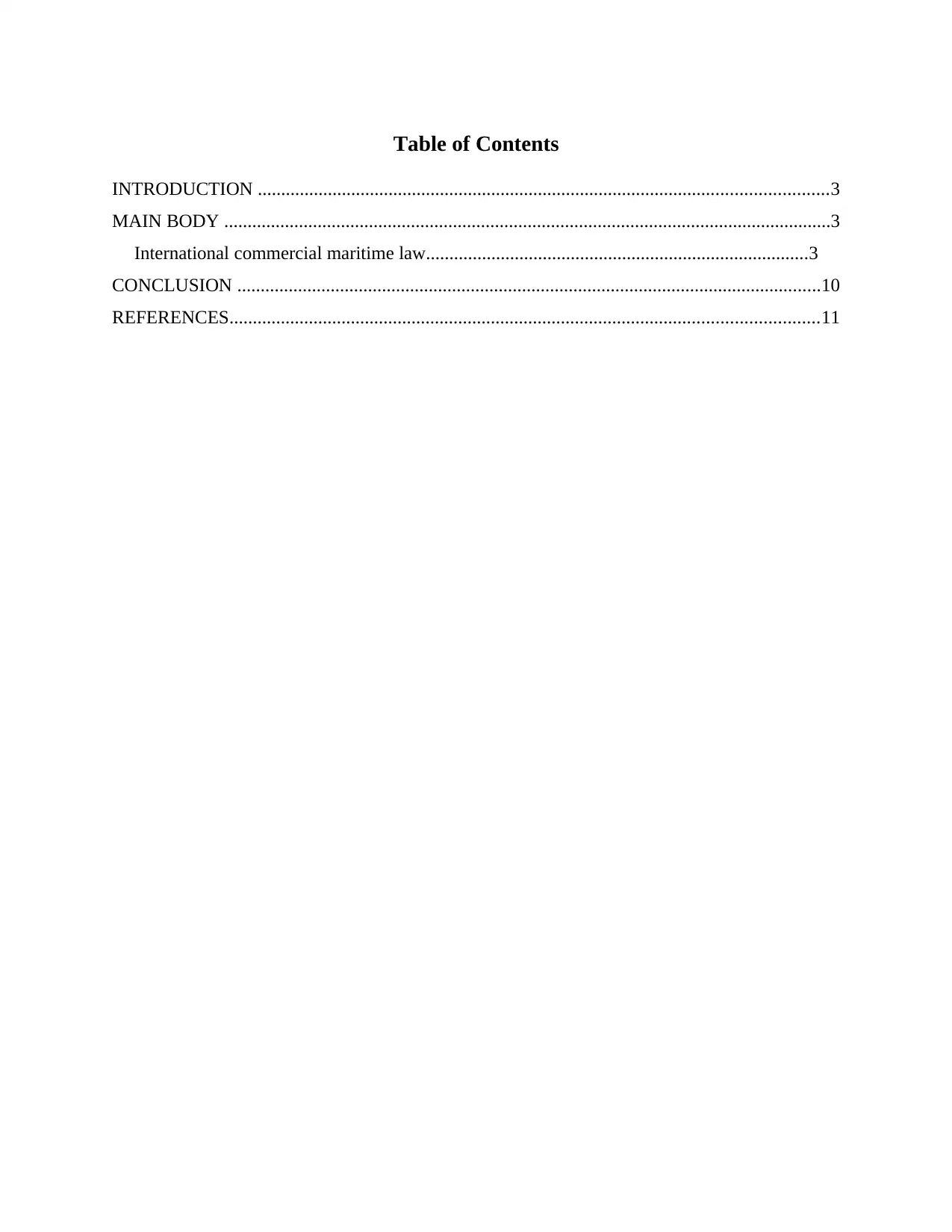
Table of Contents
INTRODUCTION ..........................................................................................................................3
MAIN BODY ..................................................................................................................................3
International commercial maritime law..................................................................................3
CONCLUSION .............................................................................................................................10
REFERENCES..............................................................................................................................11
INTRODUCTION ..........................................................................................................................3
MAIN BODY ..................................................................................................................................3
International commercial maritime law..................................................................................3
CONCLUSION .............................................................................................................................10
REFERENCES..............................................................................................................................11
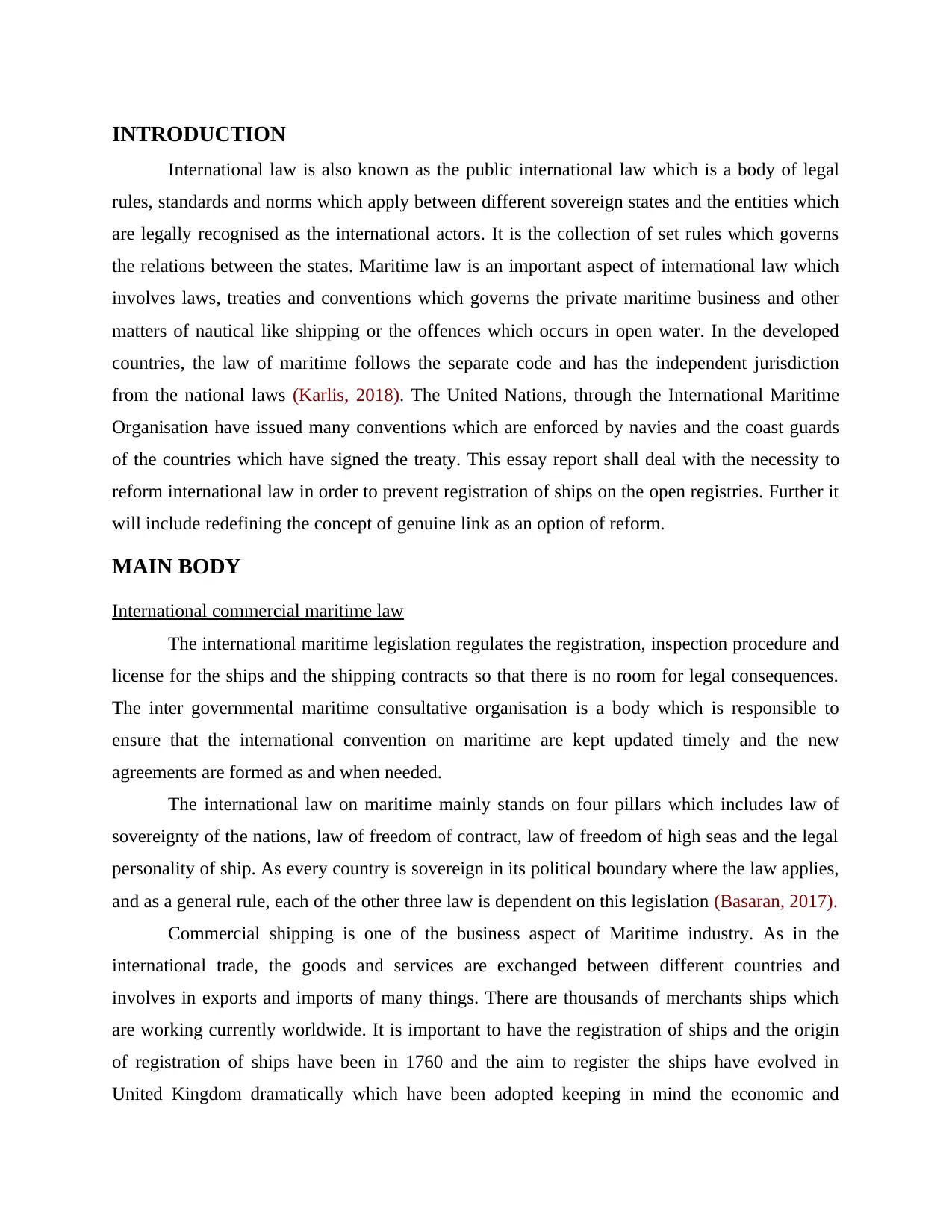
INTRODUCTION
International law is also known as the public international law which is a body of legal
rules, standards and norms which apply between different sovereign states and the entities which
are legally recognised as the international actors. It is the collection of set rules which governs
the relations between the states. Maritime law is an important aspect of international law which
involves laws, treaties and conventions which governs the private maritime business and other
matters of nautical like shipping or the offences which occurs in open water. In the developed
countries, the law of maritime follows the separate code and has the independent jurisdiction
from the national laws (Karlis, 2018). The United Nations, through the International Maritime
Organisation have issued many conventions which are enforced by navies and the coast guards
of the countries which have signed the treaty. This essay report shall deal with the necessity to
reform international law in order to prevent registration of ships on the open registries. Further it
will include redefining the concept of genuine link as an option of reform.
MAIN BODY
International commercial maritime law
The international maritime legislation regulates the registration, inspection procedure and
license for the ships and the shipping contracts so that there is no room for legal consequences.
The inter governmental maritime consultative organisation is a body which is responsible to
ensure that the international convention on maritime are kept updated timely and the new
agreements are formed as and when needed.
The international law on maritime mainly stands on four pillars which includes law of
sovereignty of the nations, law of freedom of contract, law of freedom of high seas and the legal
personality of ship. As every country is sovereign in its political boundary where the law applies,
and as a general rule, each of the other three law is dependent on this legislation (Basaran, 2017).
Commercial shipping is one of the business aspect of Maritime industry. As in the
international trade, the goods and services are exchanged between different countries and
involves in exports and imports of many things. There are thousands of merchants ships which
are working currently worldwide. It is important to have the registration of ships and the origin
of registration of ships have been in 1760 and the aim to register the ships have evolved in
United Kingdom dramatically which have been adopted keeping in mind the economic and
International law is also known as the public international law which is a body of legal
rules, standards and norms which apply between different sovereign states and the entities which
are legally recognised as the international actors. It is the collection of set rules which governs
the relations between the states. Maritime law is an important aspect of international law which
involves laws, treaties and conventions which governs the private maritime business and other
matters of nautical like shipping or the offences which occurs in open water. In the developed
countries, the law of maritime follows the separate code and has the independent jurisdiction
from the national laws (Karlis, 2018). The United Nations, through the International Maritime
Organisation have issued many conventions which are enforced by navies and the coast guards
of the countries which have signed the treaty. This essay report shall deal with the necessity to
reform international law in order to prevent registration of ships on the open registries. Further it
will include redefining the concept of genuine link as an option of reform.
MAIN BODY
International commercial maritime law
The international maritime legislation regulates the registration, inspection procedure and
license for the ships and the shipping contracts so that there is no room for legal consequences.
The inter governmental maritime consultative organisation is a body which is responsible to
ensure that the international convention on maritime are kept updated timely and the new
agreements are formed as and when needed.
The international law on maritime mainly stands on four pillars which includes law of
sovereignty of the nations, law of freedom of contract, law of freedom of high seas and the legal
personality of ship. As every country is sovereign in its political boundary where the law applies,
and as a general rule, each of the other three law is dependent on this legislation (Basaran, 2017).
Commercial shipping is one of the business aspect of Maritime industry. As in the
international trade, the goods and services are exchanged between different countries and
involves in exports and imports of many things. There are thousands of merchants ships which
are working currently worldwide. It is important to have the registration of ships and the origin
of registration of ships have been in 1760 and the aim to register the ships have evolved in
United Kingdom dramatically which have been adopted keeping in mind the economic and
⊘ This is a preview!⊘
Do you want full access?
Subscribe today to unlock all pages.

Trusted by 1+ million students worldwide
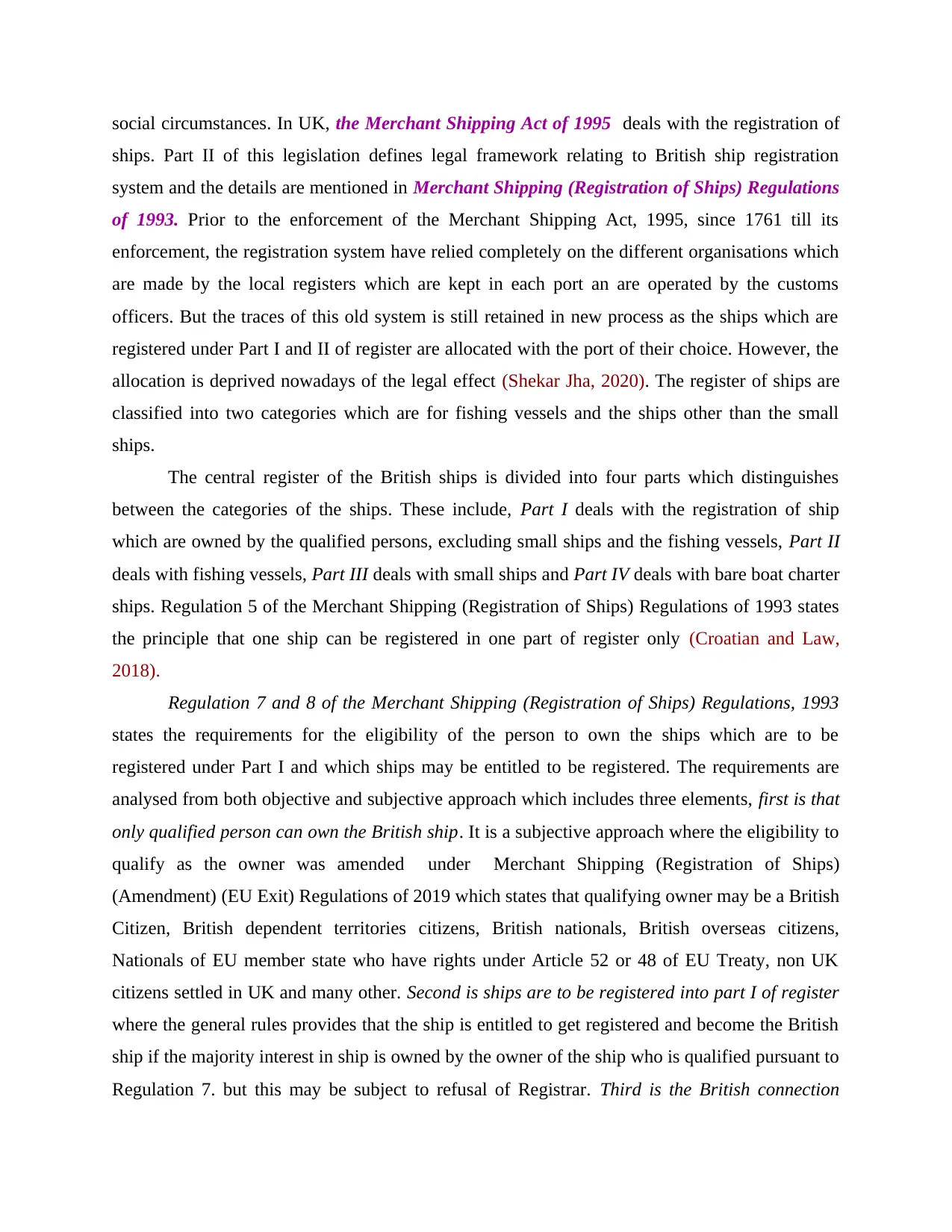
social circumstances. In UK, the Merchant Shipping Act of 1995 deals with the registration of
ships. Part II of this legislation defines legal framework relating to British ship registration
system and the details are mentioned in Merchant Shipping (Registration of Ships) Regulations
of 1993. Prior to the enforcement of the Merchant Shipping Act, 1995, since 1761 till its
enforcement, the registration system have relied completely on the different organisations which
are made by the local registers which are kept in each port an are operated by the customs
officers. But the traces of this old system is still retained in new process as the ships which are
registered under Part I and II of register are allocated with the port of their choice. However, the
allocation is deprived nowadays of the legal effect (Shekar Jha, 2020). The register of ships are
classified into two categories which are for fishing vessels and the ships other than the small
ships.
The central register of the British ships is divided into four parts which distinguishes
between the categories of the ships. These include, Part I deals with the registration of ship
which are owned by the qualified persons, excluding small ships and the fishing vessels, Part II
deals with fishing vessels, Part III deals with small ships and Part IV deals with bare boat charter
ships. Regulation 5 of the Merchant Shipping (Registration of Ships) Regulations of 1993 states
the principle that one ship can be registered in one part of register only (Croatian and Law,
2018).
Regulation 7 and 8 of the Merchant Shipping (Registration of Ships) Regulations, 1993
states the requirements for the eligibility of the person to own the ships which are to be
registered under Part I and which ships may be entitled to be registered. The requirements are
analysed from both objective and subjective approach which includes three elements, first is that
only qualified person can own the British ship. It is a subjective approach where the eligibility to
qualify as the owner was amended under Merchant Shipping (Registration of Ships)
(Amendment) (EU Exit) Regulations of 2019 which states that qualifying owner may be a British
Citizen, British dependent territories citizens, British nationals, British overseas citizens,
Nationals of EU member state who have rights under Article 52 or 48 of EU Treaty, non UK
citizens settled in UK and many other. Second is ships are to be registered into part I of register
where the general rules provides that the ship is entitled to get registered and become the British
ship if the majority interest in ship is owned by the owner of the ship who is qualified pursuant to
Regulation 7. but this may be subject to refusal of Registrar. Third is the British connection
ships. Part II of this legislation defines legal framework relating to British ship registration
system and the details are mentioned in Merchant Shipping (Registration of Ships) Regulations
of 1993. Prior to the enforcement of the Merchant Shipping Act, 1995, since 1761 till its
enforcement, the registration system have relied completely on the different organisations which
are made by the local registers which are kept in each port an are operated by the customs
officers. But the traces of this old system is still retained in new process as the ships which are
registered under Part I and II of register are allocated with the port of their choice. However, the
allocation is deprived nowadays of the legal effect (Shekar Jha, 2020). The register of ships are
classified into two categories which are for fishing vessels and the ships other than the small
ships.
The central register of the British ships is divided into four parts which distinguishes
between the categories of the ships. These include, Part I deals with the registration of ship
which are owned by the qualified persons, excluding small ships and the fishing vessels, Part II
deals with fishing vessels, Part III deals with small ships and Part IV deals with bare boat charter
ships. Regulation 5 of the Merchant Shipping (Registration of Ships) Regulations of 1993 states
the principle that one ship can be registered in one part of register only (Croatian and Law,
2018).
Regulation 7 and 8 of the Merchant Shipping (Registration of Ships) Regulations, 1993
states the requirements for the eligibility of the person to own the ships which are to be
registered under Part I and which ships may be entitled to be registered. The requirements are
analysed from both objective and subjective approach which includes three elements, first is that
only qualified person can own the British ship. It is a subjective approach where the eligibility to
qualify as the owner was amended under Merchant Shipping (Registration of Ships)
(Amendment) (EU Exit) Regulations of 2019 which states that qualifying owner may be a British
Citizen, British dependent territories citizens, British nationals, British overseas citizens,
Nationals of EU member state who have rights under Article 52 or 48 of EU Treaty, non UK
citizens settled in UK and many other. Second is ships are to be registered into part I of register
where the general rules provides that the ship is entitled to get registered and become the British
ship if the majority interest in ship is owned by the owner of the ship who is qualified pursuant to
Regulation 7. but this may be subject to refusal of Registrar. Third is the British connection
Paraphrase This Document
Need a fresh take? Get an instant paraphrase of this document with our AI Paraphraser
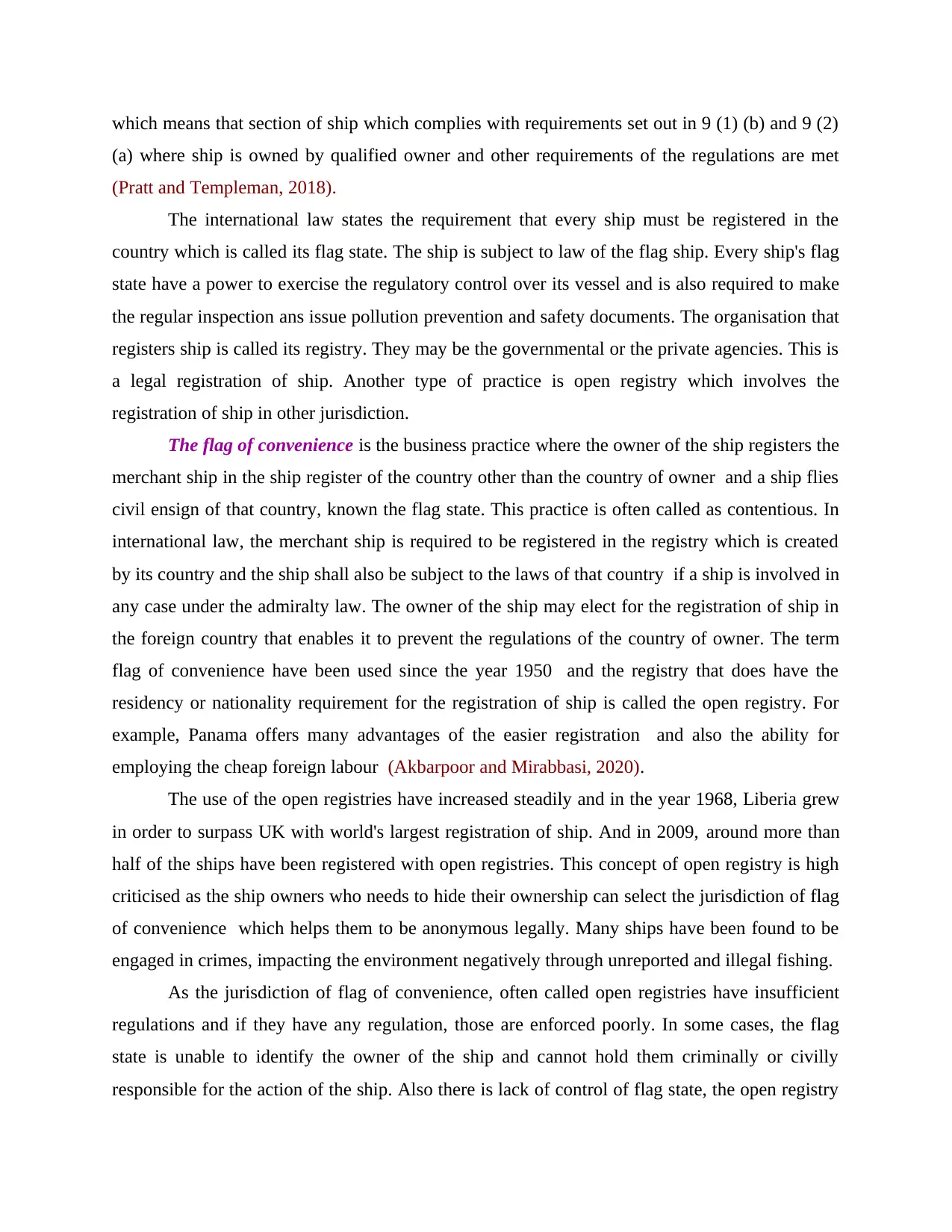
which means that section of ship which complies with requirements set out in 9 (1) (b) and 9 (2)
(a) where ship is owned by qualified owner and other requirements of the regulations are met
(Pratt and Templeman, 2018).
The international law states the requirement that every ship must be registered in the
country which is called its flag state. The ship is subject to law of the flag ship. Every ship's flag
state have a power to exercise the regulatory control over its vessel and is also required to make
the regular inspection ans issue pollution prevention and safety documents. The organisation that
registers ship is called its registry. They may be the governmental or the private agencies. This is
a legal registration of ship. Another type of practice is open registry which involves the
registration of ship in other jurisdiction.
The flag of convenience is the business practice where the owner of the ship registers the
merchant ship in the ship register of the country other than the country of owner and a ship flies
civil ensign of that country, known the flag state. This practice is often called as contentious. In
international law, the merchant ship is required to be registered in the registry which is created
by its country and the ship shall also be subject to the laws of that country if a ship is involved in
any case under the admiralty law. The owner of the ship may elect for the registration of ship in
the foreign country that enables it to prevent the regulations of the country of owner. The term
flag of convenience have been used since the year 1950 and the registry that does have the
residency or nationality requirement for the registration of ship is called the open registry. For
example, Panama offers many advantages of the easier registration and also the ability for
employing the cheap foreign labour (Akbarpoor and Mirabbasi, 2020).
The use of the open registries have increased steadily and in the year 1968, Liberia grew
in order to surpass UK with world's largest registration of ship. And in 2009, around more than
half of the ships have been registered with open registries. This concept of open registry is high
criticised as the ship owners who needs to hide their ownership can select the jurisdiction of flag
of convenience which helps them to be anonymous legally. Many ships have been found to be
engaged in crimes, impacting the environment negatively through unreported and illegal fishing.
As the jurisdiction of flag of convenience, often called open registries have insufficient
regulations and if they have any regulation, those are enforced poorly. In some cases, the flag
state is unable to identify the owner of the ship and cannot hold them criminally or civilly
responsible for the action of the ship. Also there is lack of control of flag state, the open registry
(a) where ship is owned by qualified owner and other requirements of the regulations are met
(Pratt and Templeman, 2018).
The international law states the requirement that every ship must be registered in the
country which is called its flag state. The ship is subject to law of the flag ship. Every ship's flag
state have a power to exercise the regulatory control over its vessel and is also required to make
the regular inspection ans issue pollution prevention and safety documents. The organisation that
registers ship is called its registry. They may be the governmental or the private agencies. This is
a legal registration of ship. Another type of practice is open registry which involves the
registration of ship in other jurisdiction.
The flag of convenience is the business practice where the owner of the ship registers the
merchant ship in the ship register of the country other than the country of owner and a ship flies
civil ensign of that country, known the flag state. This practice is often called as contentious. In
international law, the merchant ship is required to be registered in the registry which is created
by its country and the ship shall also be subject to the laws of that country if a ship is involved in
any case under the admiralty law. The owner of the ship may elect for the registration of ship in
the foreign country that enables it to prevent the regulations of the country of owner. The term
flag of convenience have been used since the year 1950 and the registry that does have the
residency or nationality requirement for the registration of ship is called the open registry. For
example, Panama offers many advantages of the easier registration and also the ability for
employing the cheap foreign labour (Akbarpoor and Mirabbasi, 2020).
The use of the open registries have increased steadily and in the year 1968, Liberia grew
in order to surpass UK with world's largest registration of ship. And in 2009, around more than
half of the ships have been registered with open registries. This concept of open registry is high
criticised as the ship owners who needs to hide their ownership can select the jurisdiction of flag
of convenience which helps them to be anonymous legally. Many ships have been found to be
engaged in crimes, impacting the environment negatively through unreported and illegal fishing.
As the jurisdiction of flag of convenience, often called open registries have insufficient
regulations and if they have any regulation, those are enforced poorly. In some cases, the flag
state is unable to identify the owner of the ship and cannot hold them criminally or civilly
responsible for the action of the ship. Also there is lack of control of flag state, the open registry
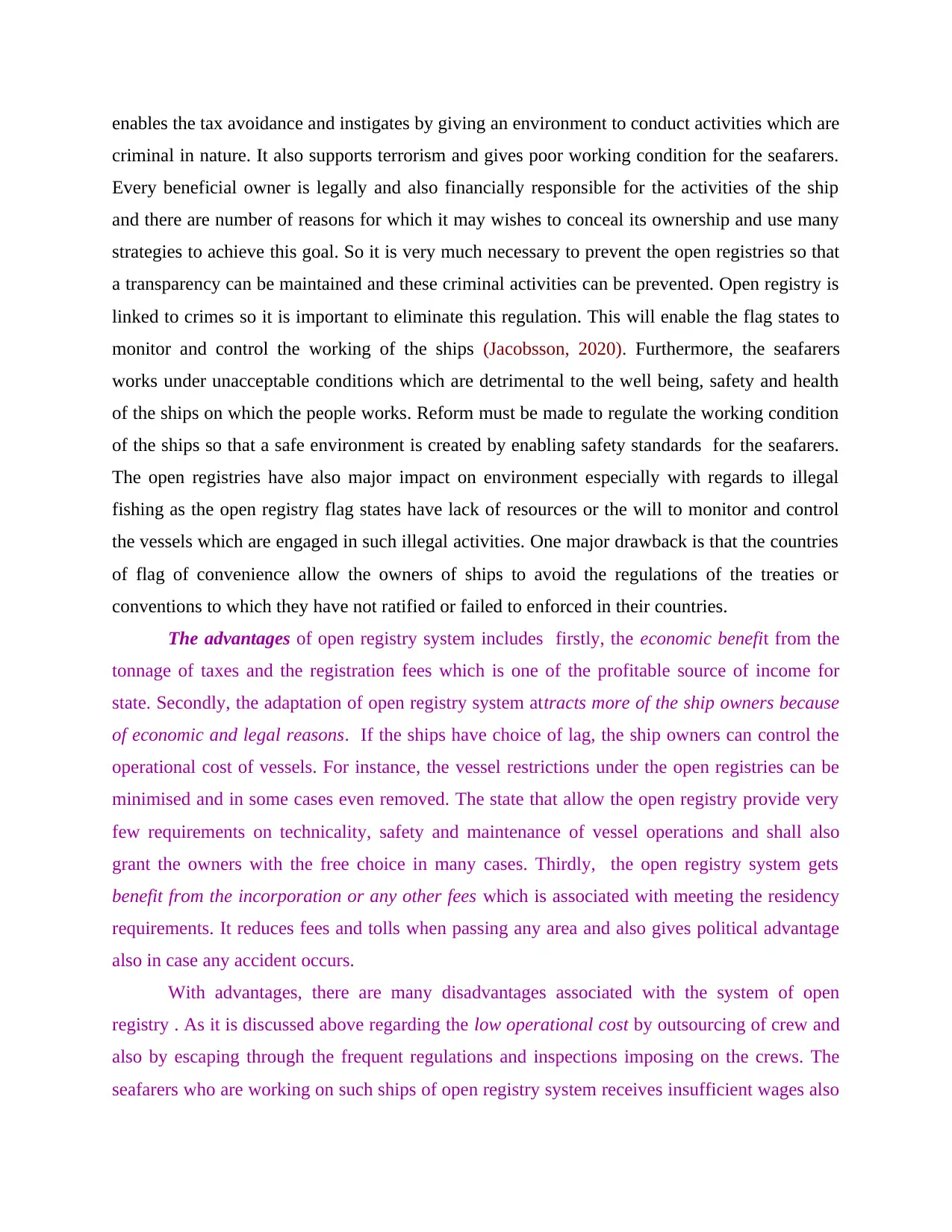
enables the tax avoidance and instigates by giving an environment to conduct activities which are
criminal in nature. It also supports terrorism and gives poor working condition for the seafarers.
Every beneficial owner is legally and also financially responsible for the activities of the ship
and there are number of reasons for which it may wishes to conceal its ownership and use many
strategies to achieve this goal. So it is very much necessary to prevent the open registries so that
a transparency can be maintained and these criminal activities can be prevented. Open registry is
linked to crimes so it is important to eliminate this regulation. This will enable the flag states to
monitor and control the working of the ships (Jacobsson, 2020). Furthermore, the seafarers
works under unacceptable conditions which are detrimental to the well being, safety and health
of the ships on which the people works. Reform must be made to regulate the working condition
of the ships so that a safe environment is created by enabling safety standards for the seafarers.
The open registries have also major impact on environment especially with regards to illegal
fishing as the open registry flag states have lack of resources or the will to monitor and control
the vessels which are engaged in such illegal activities. One major drawback is that the countries
of flag of convenience allow the owners of ships to avoid the regulations of the treaties or
conventions to which they have not ratified or failed to enforced in their countries.
The advantages of open registry system includes firstly, the economic benefit from the
tonnage of taxes and the registration fees which is one of the profitable source of income for
state. Secondly, the adaptation of open registry system attracts more of the ship owners because
of economic and legal reasons. If the ships have choice of lag, the ship owners can control the
operational cost of vessels. For instance, the vessel restrictions under the open registries can be
minimised and in some cases even removed. The state that allow the open registry provide very
few requirements on technicality, safety and maintenance of vessel operations and shall also
grant the owners with the free choice in many cases. Thirdly, the open registry system gets
benefit from the incorporation or any other fees which is associated with meeting the residency
requirements. It reduces fees and tolls when passing any area and also gives political advantage
also in case any accident occurs.
With advantages, there are many disadvantages associated with the system of open
registry . As it is discussed above regarding the low operational cost by outsourcing of crew and
also by escaping through the frequent regulations and inspections imposing on the crews. The
seafarers who are working on such ships of open registry system receives insufficient wages also
criminal in nature. It also supports terrorism and gives poor working condition for the seafarers.
Every beneficial owner is legally and also financially responsible for the activities of the ship
and there are number of reasons for which it may wishes to conceal its ownership and use many
strategies to achieve this goal. So it is very much necessary to prevent the open registries so that
a transparency can be maintained and these criminal activities can be prevented. Open registry is
linked to crimes so it is important to eliminate this regulation. This will enable the flag states to
monitor and control the working of the ships (Jacobsson, 2020). Furthermore, the seafarers
works under unacceptable conditions which are detrimental to the well being, safety and health
of the ships on which the people works. Reform must be made to regulate the working condition
of the ships so that a safe environment is created by enabling safety standards for the seafarers.
The open registries have also major impact on environment especially with regards to illegal
fishing as the open registry flag states have lack of resources or the will to monitor and control
the vessels which are engaged in such illegal activities. One major drawback is that the countries
of flag of convenience allow the owners of ships to avoid the regulations of the treaties or
conventions to which they have not ratified or failed to enforced in their countries.
The advantages of open registry system includes firstly, the economic benefit from the
tonnage of taxes and the registration fees which is one of the profitable source of income for
state. Secondly, the adaptation of open registry system attracts more of the ship owners because
of economic and legal reasons. If the ships have choice of lag, the ship owners can control the
operational cost of vessels. For instance, the vessel restrictions under the open registries can be
minimised and in some cases even removed. The state that allow the open registry provide very
few requirements on technicality, safety and maintenance of vessel operations and shall also
grant the owners with the free choice in many cases. Thirdly, the open registry system gets
benefit from the incorporation or any other fees which is associated with meeting the residency
requirements. It reduces fees and tolls when passing any area and also gives political advantage
also in case any accident occurs.
With advantages, there are many disadvantages associated with the system of open
registry . As it is discussed above regarding the low operational cost by outsourcing of crew and
also by escaping through the frequent regulations and inspections imposing on the crews. The
seafarers who are working on such ships of open registry system receives insufficient wages also
⊘ This is a preview!⊘
Do you want full access?
Subscribe today to unlock all pages.

Trusted by 1+ million students worldwide
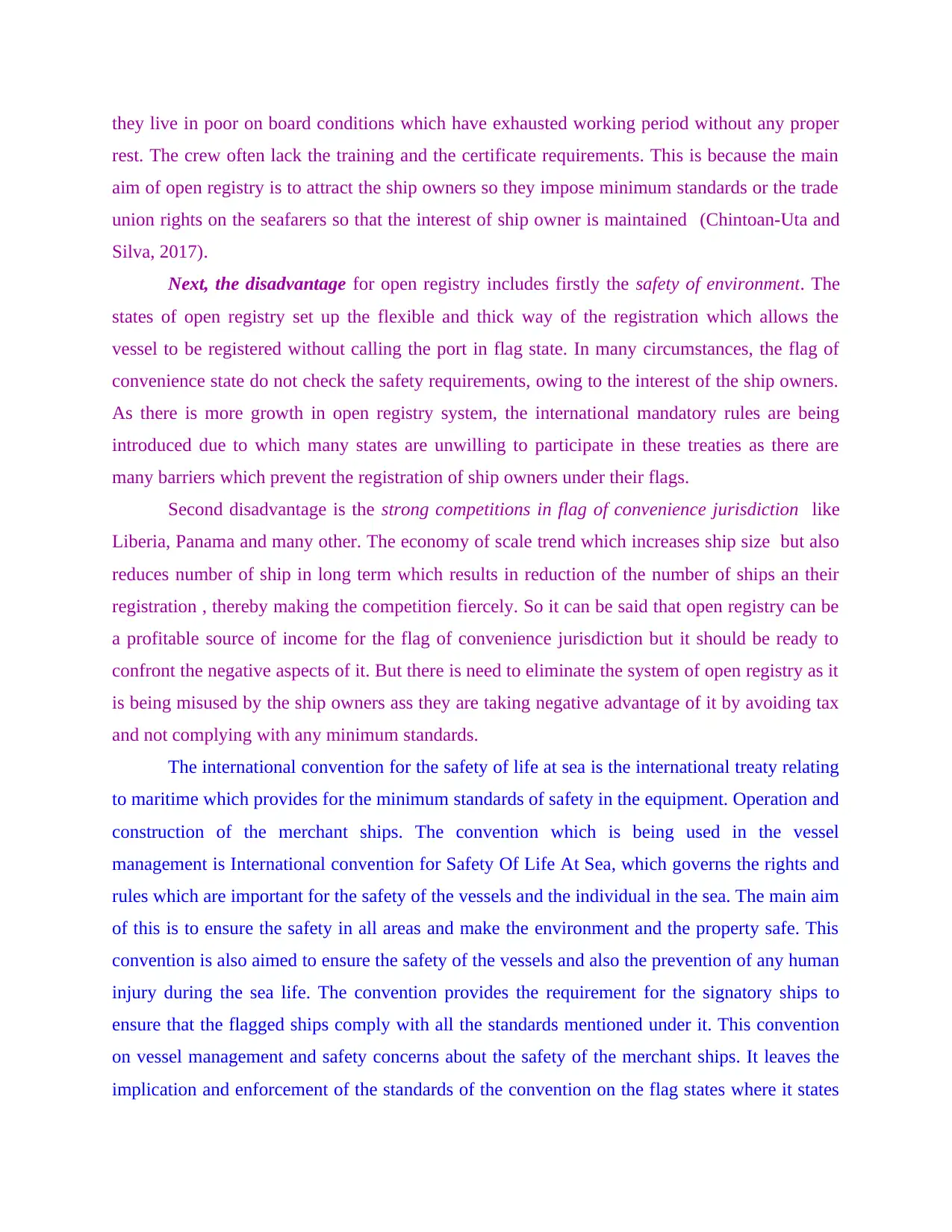
they live in poor on board conditions which have exhausted working period without any proper
rest. The crew often lack the training and the certificate requirements. This is because the main
aim of open registry is to attract the ship owners so they impose minimum standards or the trade
union rights on the seafarers so that the interest of ship owner is maintained (Chintoan-Uta and
Silva, 2017).
Next, the disadvantage for open registry includes firstly the safety of environment. The
states of open registry set up the flexible and thick way of the registration which allows the
vessel to be registered without calling the port in flag state. In many circumstances, the flag of
convenience state do not check the safety requirements, owing to the interest of the ship owners.
As there is more growth in open registry system, the international mandatory rules are being
introduced due to which many states are unwilling to participate in these treaties as there are
many barriers which prevent the registration of ship owners under their flags.
Second disadvantage is the strong competitions in flag of convenience jurisdiction like
Liberia, Panama and many other. The economy of scale trend which increases ship size but also
reduces number of ship in long term which results in reduction of the number of ships an their
registration , thereby making the competition fiercely. So it can be said that open registry can be
a profitable source of income for the flag of convenience jurisdiction but it should be ready to
confront the negative aspects of it. But there is need to eliminate the system of open registry as it
is being misused by the ship owners ass they are taking negative advantage of it by avoiding tax
and not complying with any minimum standards.
The international convention for the safety of life at sea is the international treaty relating
to maritime which provides for the minimum standards of safety in the equipment. Operation and
construction of the merchant ships. The convention which is being used in the vessel
management is International convention for Safety Of Life At Sea, which governs the rights and
rules which are important for the safety of the vessels and the individual in the sea. The main aim
of this is to ensure the safety in all areas and make the environment and the property safe. This
convention is also aimed to ensure the safety of the vessels and also the prevention of any human
injury during the sea life. The convention provides the requirement for the signatory ships to
ensure that the flagged ships comply with all the standards mentioned under it. This convention
on vessel management and safety concerns about the safety of the merchant ships. It leaves the
implication and enforcement of the standards of the convention on the flag states where it states
rest. The crew often lack the training and the certificate requirements. This is because the main
aim of open registry is to attract the ship owners so they impose minimum standards or the trade
union rights on the seafarers so that the interest of ship owner is maintained (Chintoan-Uta and
Silva, 2017).
Next, the disadvantage for open registry includes firstly the safety of environment. The
states of open registry set up the flexible and thick way of the registration which allows the
vessel to be registered without calling the port in flag state. In many circumstances, the flag of
convenience state do not check the safety requirements, owing to the interest of the ship owners.
As there is more growth in open registry system, the international mandatory rules are being
introduced due to which many states are unwilling to participate in these treaties as there are
many barriers which prevent the registration of ship owners under their flags.
Second disadvantage is the strong competitions in flag of convenience jurisdiction like
Liberia, Panama and many other. The economy of scale trend which increases ship size but also
reduces number of ship in long term which results in reduction of the number of ships an their
registration , thereby making the competition fiercely. So it can be said that open registry can be
a profitable source of income for the flag of convenience jurisdiction but it should be ready to
confront the negative aspects of it. But there is need to eliminate the system of open registry as it
is being misused by the ship owners ass they are taking negative advantage of it by avoiding tax
and not complying with any minimum standards.
The international convention for the safety of life at sea is the international treaty relating
to maritime which provides for the minimum standards of safety in the equipment. Operation and
construction of the merchant ships. The convention which is being used in the vessel
management is International convention for Safety Of Life At Sea, which governs the rights and
rules which are important for the safety of the vessels and the individual in the sea. The main aim
of this is to ensure the safety in all areas and make the environment and the property safe. This
convention is also aimed to ensure the safety of the vessels and also the prevention of any human
injury during the sea life. The convention provides the requirement for the signatory ships to
ensure that the flagged ships comply with all the standards mentioned under it. This convention
on vessel management and safety concerns about the safety of the merchant ships. It leaves the
implication and enforcement of the standards of the convention on the flag states where it states
Paraphrase This Document
Need a fresh take? Get an instant paraphrase of this document with our AI Paraphraser
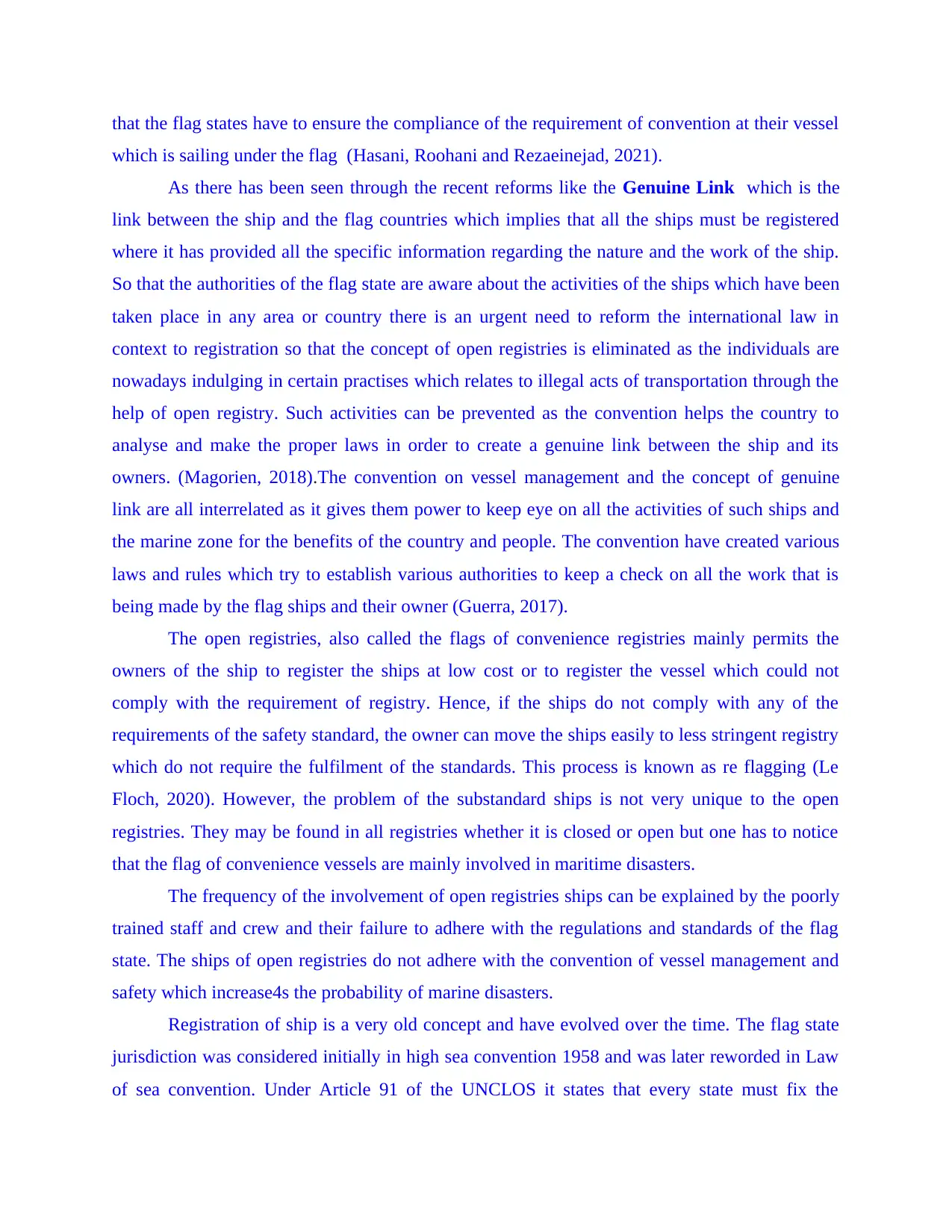
that the flag states have to ensure the compliance of the requirement of convention at their vessel
which is sailing under the flag (Hasani, Roohani and Rezaeinejad, 2021).
As there has been seen through the recent reforms like the Genuine Link which is the
link between the ship and the flag countries which implies that all the ships must be registered
where it has provided all the specific information regarding the nature and the work of the ship.
So that the authorities of the flag state are aware about the activities of the ships which have been
taken place in any area or country there is an urgent need to reform the international law in
context to registration so that the concept of open registries is eliminated as the individuals are
nowadays indulging in certain practises which relates to illegal acts of transportation through the
help of open registry. Such activities can be prevented as the convention helps the country to
analyse and make the proper laws in order to create a genuine link between the ship and its
owners. (Magorien, 2018).The convention on vessel management and the concept of genuine
link are all interrelated as it gives them power to keep eye on all the activities of such ships and
the marine zone for the benefits of the country and people. The convention have created various
laws and rules which try to establish various authorities to keep a check on all the work that is
being made by the flag ships and their owner (Guerra, 2017).
The open registries, also called the flags of convenience registries mainly permits the
owners of the ship to register the ships at low cost or to register the vessel which could not
comply with the requirement of registry. Hence, if the ships do not comply with any of the
requirements of the safety standard, the owner can move the ships easily to less stringent registry
which do not require the fulfilment of the standards. This process is known as re flagging (Le
Floch, 2020). However, the problem of the substandard ships is not very unique to the open
registries. They may be found in all registries whether it is closed or open but one has to notice
that the flag of convenience vessels are mainly involved in maritime disasters.
The frequency of the involvement of open registries ships can be explained by the poorly
trained staff and crew and their failure to adhere with the regulations and standards of the flag
state. The ships of open registries do not adhere with the convention of vessel management and
safety which increase4s the probability of marine disasters.
Registration of ship is a very old concept and have evolved over the time. The flag state
jurisdiction was considered initially in high sea convention 1958 and was later reworded in Law
of sea convention. Under Article 91 of the UNCLOS it states that every state must fix the
which is sailing under the flag (Hasani, Roohani and Rezaeinejad, 2021).
As there has been seen through the recent reforms like the Genuine Link which is the
link between the ship and the flag countries which implies that all the ships must be registered
where it has provided all the specific information regarding the nature and the work of the ship.
So that the authorities of the flag state are aware about the activities of the ships which have been
taken place in any area or country there is an urgent need to reform the international law in
context to registration so that the concept of open registries is eliminated as the individuals are
nowadays indulging in certain practises which relates to illegal acts of transportation through the
help of open registry. Such activities can be prevented as the convention helps the country to
analyse and make the proper laws in order to create a genuine link between the ship and its
owners. (Magorien, 2018).The convention on vessel management and the concept of genuine
link are all interrelated as it gives them power to keep eye on all the activities of such ships and
the marine zone for the benefits of the country and people. The convention have created various
laws and rules which try to establish various authorities to keep a check on all the work that is
being made by the flag ships and their owner (Guerra, 2017).
The open registries, also called the flags of convenience registries mainly permits the
owners of the ship to register the ships at low cost or to register the vessel which could not
comply with the requirement of registry. Hence, if the ships do not comply with any of the
requirements of the safety standard, the owner can move the ships easily to less stringent registry
which do not require the fulfilment of the standards. This process is known as re flagging (Le
Floch, 2020). However, the problem of the substandard ships is not very unique to the open
registries. They may be found in all registries whether it is closed or open but one has to notice
that the flag of convenience vessels are mainly involved in maritime disasters.
The frequency of the involvement of open registries ships can be explained by the poorly
trained staff and crew and their failure to adhere with the regulations and standards of the flag
state. The ships of open registries do not adhere with the convention of vessel management and
safety which increase4s the probability of marine disasters.
Registration of ship is a very old concept and have evolved over the time. The flag state
jurisdiction was considered initially in high sea convention 1958 and was later reworded in Law
of sea convention. Under Article 91 of the UNCLOS it states that every state must fix the
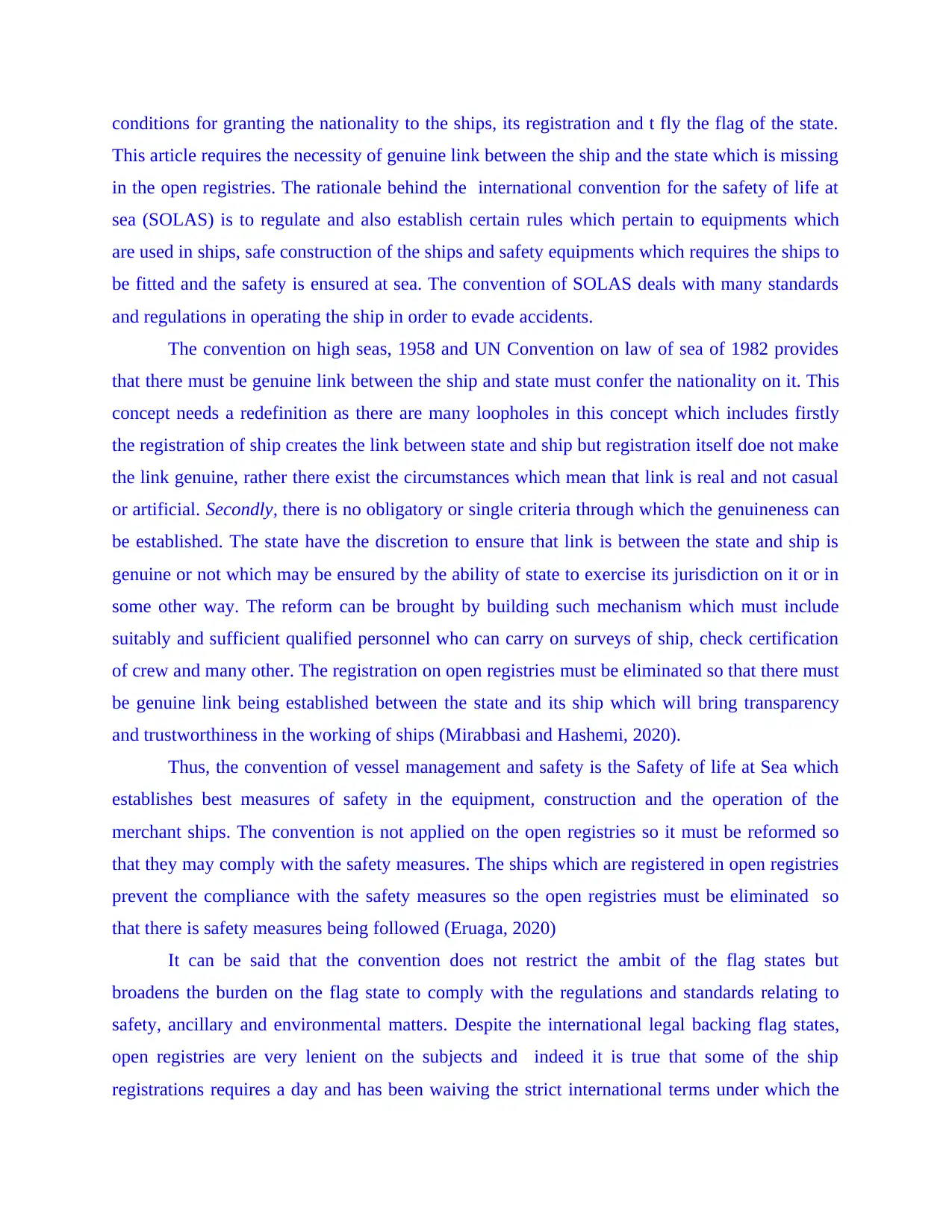
conditions for granting the nationality to the ships, its registration and t fly the flag of the state.
This article requires the necessity of genuine link between the ship and the state which is missing
in the open registries. The rationale behind the international convention for the safety of life at
sea (SOLAS) is to regulate and also establish certain rules which pertain to equipments which
are used in ships, safe construction of the ships and safety equipments which requires the ships to
be fitted and the safety is ensured at sea. The convention of SOLAS deals with many standards
and regulations in operating the ship in order to evade accidents.
The convention on high seas, 1958 and UN Convention on law of sea of 1982 provides
that there must be genuine link between the ship and state must confer the nationality on it. This
concept needs a redefinition as there are many loopholes in this concept which includes firstly
the registration of ship creates the link between state and ship but registration itself doe not make
the link genuine, rather there exist the circumstances which mean that link is real and not casual
or artificial. Secondly, there is no obligatory or single criteria through which the genuineness can
be established. The state have the discretion to ensure that link is between the state and ship is
genuine or not which may be ensured by the ability of state to exercise its jurisdiction on it or in
some other way. The reform can be brought by building such mechanism which must include
suitably and sufficient qualified personnel who can carry on surveys of ship, check certification
of crew and many other. The registration on open registries must be eliminated so that there must
be genuine link being established between the state and its ship which will bring transparency
and trustworthiness in the working of ships (Mirabbasi and Hashemi, 2020).
Thus, the convention of vessel management and safety is the Safety of life at Sea which
establishes best measures of safety in the equipment, construction and the operation of the
merchant ships. The convention is not applied on the open registries so it must be reformed so
that they may comply with the safety measures. The ships which are registered in open registries
prevent the compliance with the safety measures so the open registries must be eliminated so
that there is safety measures being followed (Eruaga, 2020)
It can be said that the convention does not restrict the ambit of the flag states but
broadens the burden on the flag state to comply with the regulations and standards relating to
safety, ancillary and environmental matters. Despite the international legal backing flag states,
open registries are very lenient on the subjects and indeed it is true that some of the ship
registrations requires a day and has been waiving the strict international terms under which the
This article requires the necessity of genuine link between the ship and the state which is missing
in the open registries. The rationale behind the international convention for the safety of life at
sea (SOLAS) is to regulate and also establish certain rules which pertain to equipments which
are used in ships, safe construction of the ships and safety equipments which requires the ships to
be fitted and the safety is ensured at sea. The convention of SOLAS deals with many standards
and regulations in operating the ship in order to evade accidents.
The convention on high seas, 1958 and UN Convention on law of sea of 1982 provides
that there must be genuine link between the ship and state must confer the nationality on it. This
concept needs a redefinition as there are many loopholes in this concept which includes firstly
the registration of ship creates the link between state and ship but registration itself doe not make
the link genuine, rather there exist the circumstances which mean that link is real and not casual
or artificial. Secondly, there is no obligatory or single criteria through which the genuineness can
be established. The state have the discretion to ensure that link is between the state and ship is
genuine or not which may be ensured by the ability of state to exercise its jurisdiction on it or in
some other way. The reform can be brought by building such mechanism which must include
suitably and sufficient qualified personnel who can carry on surveys of ship, check certification
of crew and many other. The registration on open registries must be eliminated so that there must
be genuine link being established between the state and its ship which will bring transparency
and trustworthiness in the working of ships (Mirabbasi and Hashemi, 2020).
Thus, the convention of vessel management and safety is the Safety of life at Sea which
establishes best measures of safety in the equipment, construction and the operation of the
merchant ships. The convention is not applied on the open registries so it must be reformed so
that they may comply with the safety measures. The ships which are registered in open registries
prevent the compliance with the safety measures so the open registries must be eliminated so
that there is safety measures being followed (Eruaga, 2020)
It can be said that the convention does not restrict the ambit of the flag states but
broadens the burden on the flag state to comply with the regulations and standards relating to
safety, ancillary and environmental matters. Despite the international legal backing flag states,
open registries are very lenient on the subjects and indeed it is true that some of the ship
registrations requires a day and has been waiving the strict international terms under which the
⊘ This is a preview!⊘
Do you want full access?
Subscribe today to unlock all pages.

Trusted by 1+ million students worldwide
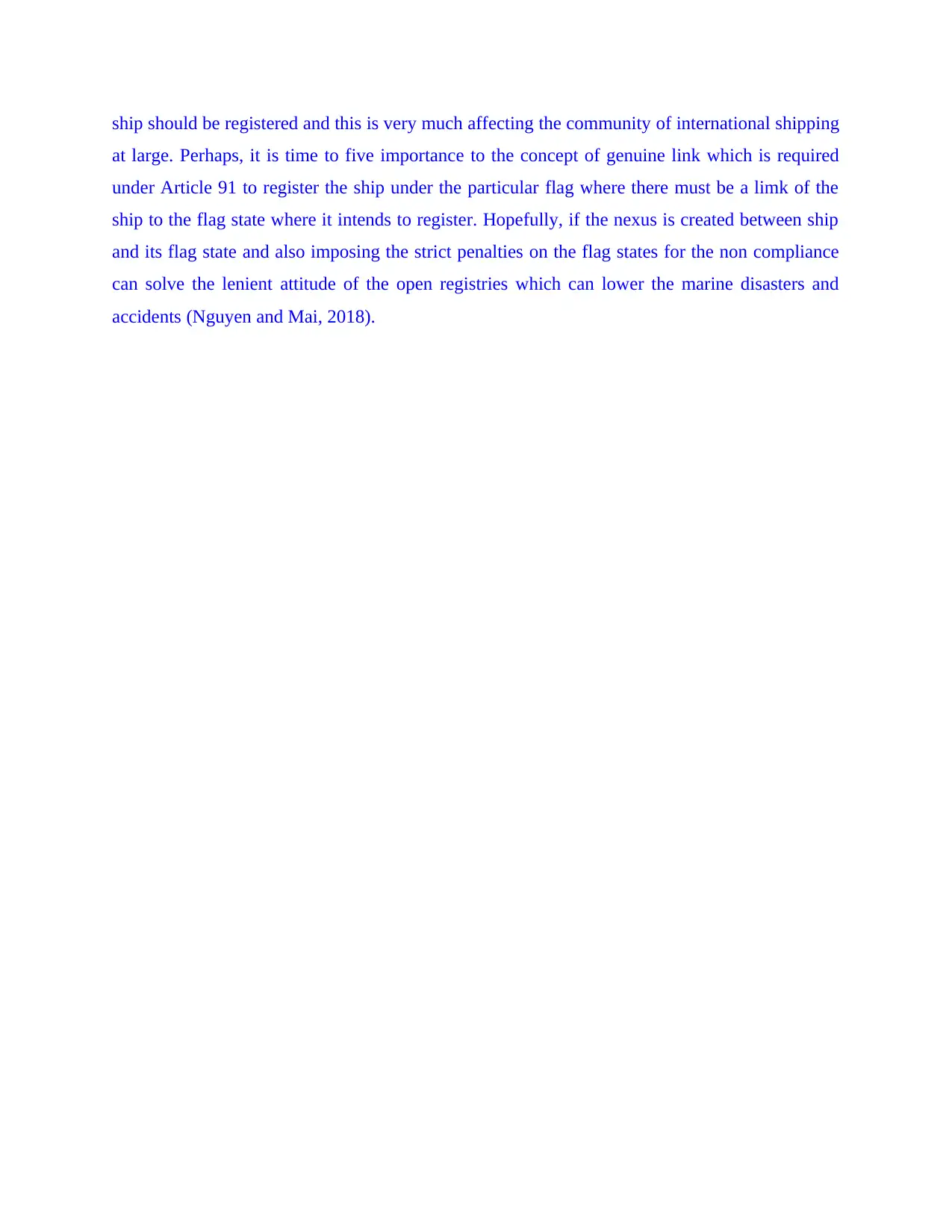
ship should be registered and this is very much affecting the community of international shipping
at large. Perhaps, it is time to five importance to the concept of genuine link which is required
under Article 91 to register the ship under the particular flag where there must be a limk of the
ship to the flag state where it intends to register. Hopefully, if the nexus is created between ship
and its flag state and also imposing the strict penalties on the flag states for the non compliance
can solve the lenient attitude of the open registries which can lower the marine disasters and
accidents (Nguyen and Mai, 2018).
at large. Perhaps, it is time to five importance to the concept of genuine link which is required
under Article 91 to register the ship under the particular flag where there must be a limk of the
ship to the flag state where it intends to register. Hopefully, if the nexus is created between ship
and its flag state and also imposing the strict penalties on the flag states for the non compliance
can solve the lenient attitude of the open registries which can lower the marine disasters and
accidents (Nguyen and Mai, 2018).
Paraphrase This Document
Need a fresh take? Get an instant paraphrase of this document with our AI Paraphraser
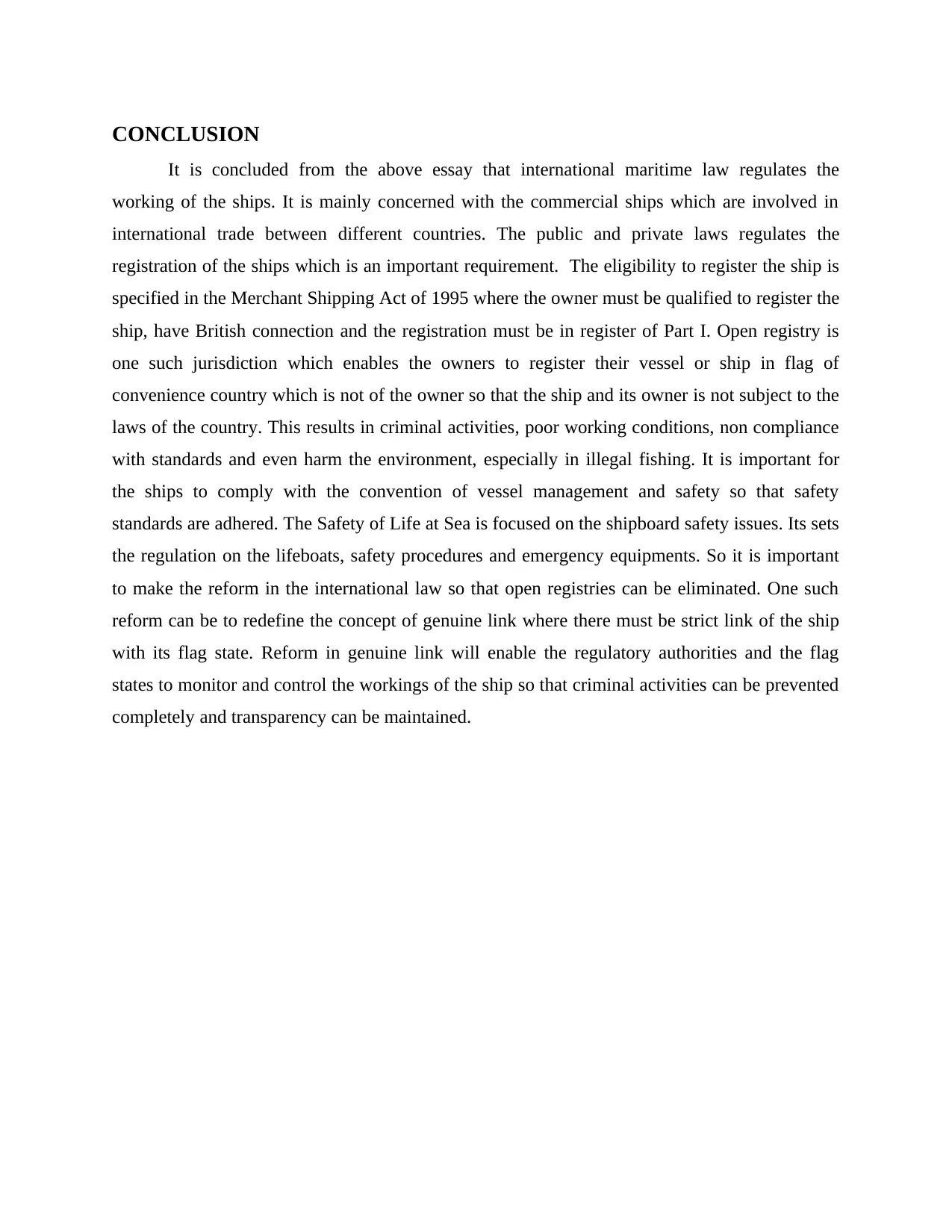
CONCLUSION
It is concluded from the above essay that international maritime law regulates the
working of the ships. It is mainly concerned with the commercial ships which are involved in
international trade between different countries. The public and private laws regulates the
registration of the ships which is an important requirement. The eligibility to register the ship is
specified in the Merchant Shipping Act of 1995 where the owner must be qualified to register the
ship, have British connection and the registration must be in register of Part I. Open registry is
one such jurisdiction which enables the owners to register their vessel or ship in flag of
convenience country which is not of the owner so that the ship and its owner is not subject to the
laws of the country. This results in criminal activities, poor working conditions, non compliance
with standards and even harm the environment, especially in illegal fishing. It is important for
the ships to comply with the convention of vessel management and safety so that safety
standards are adhered. The Safety of Life at Sea is focused on the shipboard safety issues. Its sets
the regulation on the lifeboats, safety procedures and emergency equipments. So it is important
to make the reform in the international law so that open registries can be eliminated. One such
reform can be to redefine the concept of genuine link where there must be strict link of the ship
with its flag state. Reform in genuine link will enable the regulatory authorities and the flag
states to monitor and control the workings of the ship so that criminal activities can be prevented
completely and transparency can be maintained.
It is concluded from the above essay that international maritime law regulates the
working of the ships. It is mainly concerned with the commercial ships which are involved in
international trade between different countries. The public and private laws regulates the
registration of the ships which is an important requirement. The eligibility to register the ship is
specified in the Merchant Shipping Act of 1995 where the owner must be qualified to register the
ship, have British connection and the registration must be in register of Part I. Open registry is
one such jurisdiction which enables the owners to register their vessel or ship in flag of
convenience country which is not of the owner so that the ship and its owner is not subject to the
laws of the country. This results in criminal activities, poor working conditions, non compliance
with standards and even harm the environment, especially in illegal fishing. It is important for
the ships to comply with the convention of vessel management and safety so that safety
standards are adhered. The Safety of Life at Sea is focused on the shipboard safety issues. Its sets
the regulation on the lifeboats, safety procedures and emergency equipments. So it is important
to make the reform in the international law so that open registries can be eliminated. One such
reform can be to redefine the concept of genuine link where there must be strict link of the ship
with its flag state. Reform in genuine link will enable the regulatory authorities and the flag
states to monitor and control the workings of the ship so that criminal activities can be prevented
completely and transparency can be maintained.
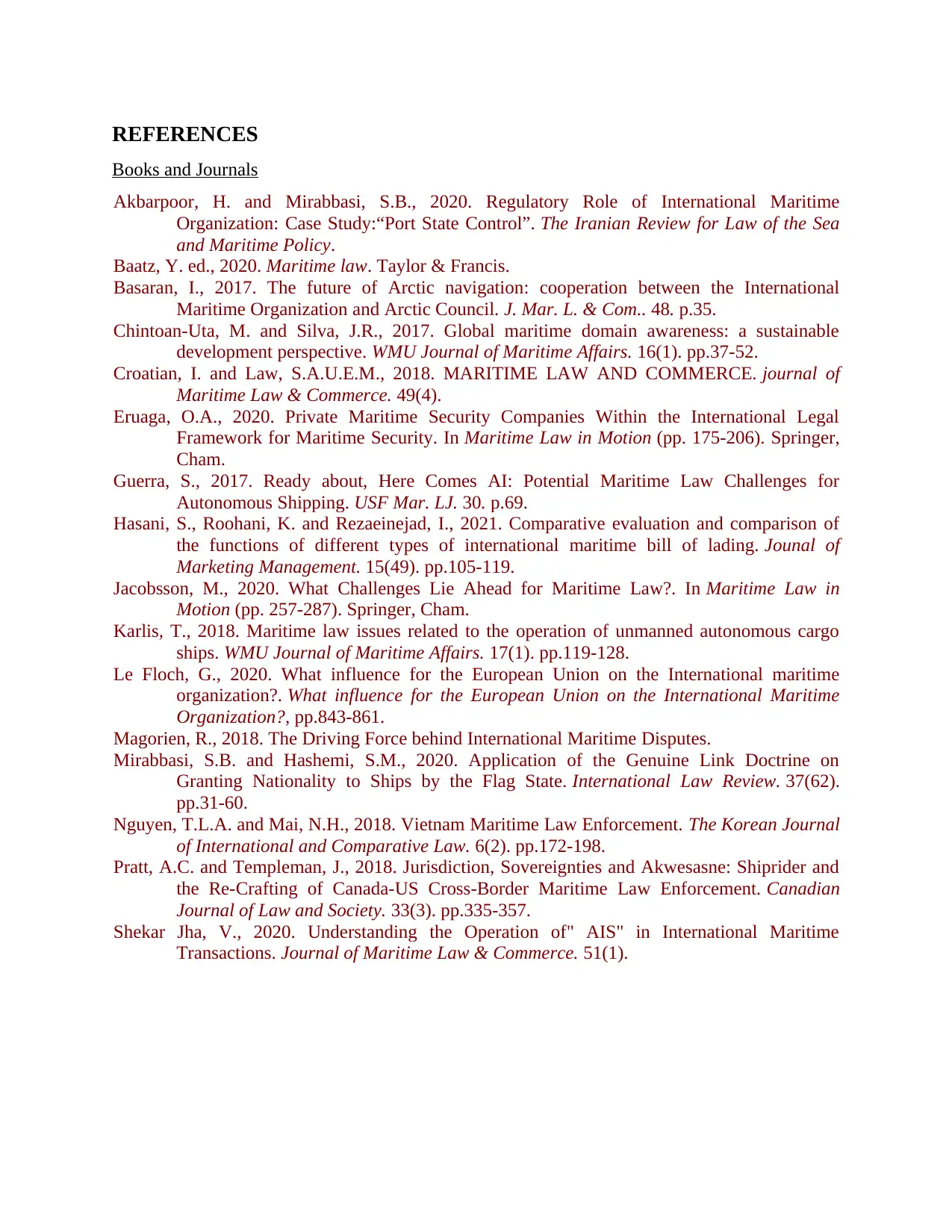
REFERENCES
Books and Journals
Akbarpoor, H. and Mirabbasi, S.B., 2020. Regulatory Role of International Maritime
Organization: Case Study:“Port State Control”. The Iranian Review for Law of the Sea
and Maritime Policy.
Baatz, Y. ed., 2020. Maritime law. Taylor & Francis.
Basaran, I., 2017. The future of Arctic navigation: cooperation between the International
Maritime Organization and Arctic Council. J. Mar. L. & Com.. 48. p.35.
Chintoan-Uta, M. and Silva, J.R., 2017. Global maritime domain awareness: a sustainable
development perspective. WMU Journal of Maritime Affairs. 16(1). pp.37-52.
Croatian, I. and Law, S.A.U.E.M., 2018. MARITIME LAW AND COMMERCE. journal of
Maritime Law & Commerce. 49(4).
Eruaga, O.A., 2020. Private Maritime Security Companies Within the International Legal
Framework for Maritime Security. In Maritime Law in Motion (pp. 175-206). Springer,
Cham.
Guerra, S., 2017. Ready about, Here Comes AI: Potential Maritime Law Challenges for
Autonomous Shipping. USF Mar. LJ. 30. p.69.
Hasani, S., Roohani, K. and Rezaeinejad, I., 2021. Comparative evaluation and comparison of
the functions of different types of international maritime bill of lading. Jounal of
Marketing Management. 15(49). pp.105-119.
Jacobsson, M., 2020. What Challenges Lie Ahead for Maritime Law?. In Maritime Law in
Motion (pp. 257-287). Springer, Cham.
Karlis, T., 2018. Maritime law issues related to the operation of unmanned autonomous cargo
ships. WMU Journal of Maritime Affairs. 17(1). pp.119-128.
Le Floch, G., 2020. What influence for the European Union on the International maritime
organization?. What influence for the European Union on the International Maritime
Organization?, pp.843-861.
Magorien, R., 2018. The Driving Force behind International Maritime Disputes.
Mirabbasi, S.B. and Hashemi, S.M., 2020. Application of the Genuine Link Doctrine on
Granting Nationality to Ships by the Flag State. International Law Review. 37(62).
pp.31-60.
Nguyen, T.L.A. and Mai, N.H., 2018. Vietnam Maritime Law Enforcement. The Korean Journal
of International and Comparative Law. 6(2). pp.172-198.
Pratt, A.C. and Templeman, J., 2018. Jurisdiction, Sovereignties and Akwesasne: Shiprider and
the Re-Crafting of Canada-US Cross-Border Maritime Law Enforcement. Canadian
Journal of Law and Society. 33(3). pp.335-357.
Shekar Jha, V., 2020. Understanding the Operation of" AIS" in International Maritime
Transactions. Journal of Maritime Law & Commerce. 51(1).
Books and Journals
Akbarpoor, H. and Mirabbasi, S.B., 2020. Regulatory Role of International Maritime
Organization: Case Study:“Port State Control”. The Iranian Review for Law of the Sea
and Maritime Policy.
Baatz, Y. ed., 2020. Maritime law. Taylor & Francis.
Basaran, I., 2017. The future of Arctic navigation: cooperation between the International
Maritime Organization and Arctic Council. J. Mar. L. & Com.. 48. p.35.
Chintoan-Uta, M. and Silva, J.R., 2017. Global maritime domain awareness: a sustainable
development perspective. WMU Journal of Maritime Affairs. 16(1). pp.37-52.
Croatian, I. and Law, S.A.U.E.M., 2018. MARITIME LAW AND COMMERCE. journal of
Maritime Law & Commerce. 49(4).
Eruaga, O.A., 2020. Private Maritime Security Companies Within the International Legal
Framework for Maritime Security. In Maritime Law in Motion (pp. 175-206). Springer,
Cham.
Guerra, S., 2017. Ready about, Here Comes AI: Potential Maritime Law Challenges for
Autonomous Shipping. USF Mar. LJ. 30. p.69.
Hasani, S., Roohani, K. and Rezaeinejad, I., 2021. Comparative evaluation and comparison of
the functions of different types of international maritime bill of lading. Jounal of
Marketing Management. 15(49). pp.105-119.
Jacobsson, M., 2020. What Challenges Lie Ahead for Maritime Law?. In Maritime Law in
Motion (pp. 257-287). Springer, Cham.
Karlis, T., 2018. Maritime law issues related to the operation of unmanned autonomous cargo
ships. WMU Journal of Maritime Affairs. 17(1). pp.119-128.
Le Floch, G., 2020. What influence for the European Union on the International maritime
organization?. What influence for the European Union on the International Maritime
Organization?, pp.843-861.
Magorien, R., 2018. The Driving Force behind International Maritime Disputes.
Mirabbasi, S.B. and Hashemi, S.M., 2020. Application of the Genuine Link Doctrine on
Granting Nationality to Ships by the Flag State. International Law Review. 37(62).
pp.31-60.
Nguyen, T.L.A. and Mai, N.H., 2018. Vietnam Maritime Law Enforcement. The Korean Journal
of International and Comparative Law. 6(2). pp.172-198.
Pratt, A.C. and Templeman, J., 2018. Jurisdiction, Sovereignties and Akwesasne: Shiprider and
the Re-Crafting of Canada-US Cross-Border Maritime Law Enforcement. Canadian
Journal of Law and Society. 33(3). pp.335-357.
Shekar Jha, V., 2020. Understanding the Operation of" AIS" in International Maritime
Transactions. Journal of Maritime Law & Commerce. 51(1).
⊘ This is a preview!⊘
Do you want full access?
Subscribe today to unlock all pages.

Trusted by 1+ million students worldwide
1 out of 12
Related Documents
Your All-in-One AI-Powered Toolkit for Academic Success.
+13062052269
info@desklib.com
Available 24*7 on WhatsApp / Email
![[object Object]](/_next/static/media/star-bottom.7253800d.svg)
Unlock your academic potential
Copyright © 2020–2026 A2Z Services. All Rights Reserved. Developed and managed by ZUCOL.





